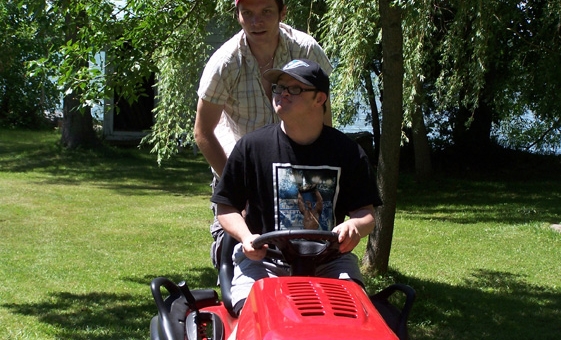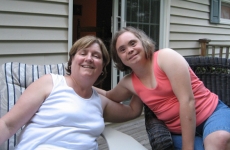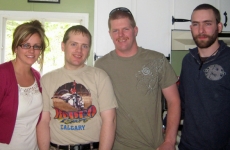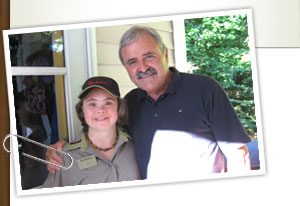Siblings
Parents often have to work hard and be extra sensitive to maintain fairness in the attention they give their other children when they have a child with a disability. If they are not attentive to this, it can be a sore point in family relations in years to come—but there are many success stories and many siblings look back on their family life as closer and warmer and their own maturing as being greater because of their sib with a disability.

The Best Gifts - by Matt Coleman
Dan has always been a bigger brother to me. This was a difficult and time consuming lesson for me to learn when I was younger–when I realized that Dan WAS in fact different from most people. But thankfully, he was understanding and patient in his teachings. While growing up, I chose to omit the fact that my brother had Down Syndrome when talking with my friends. I thought of it as an embarrassment. This could not have been more clear when Dan visited me at my high school once and I was reluctant to stay close to him. My mother asked me what the matter was, and I replied as a typical teenage would with something like “Nothing! Leave me alone.”
But slowly, I began to realize that Dan’s gifts were also not those of a typical older brother. Those of you who might know him will know Dan isn’t shy to say “Hi” to strangers and meet new people. At first, I thought this was Dan just being ignorant and stupid, but I realized that no, this was just his personality. If Dan was unashamed of meeting complete strangers, how was it that I could be scared to even speak of him to my friends? Clearly he was a bigger man than I, and I had much to learn from him.
Dan has always been the first person to wish me a Happy Birthday, the first person to welcome me home at the airport from a long trip. His caring and affection for the people around him knows no bounds, and he has been a shining example to learn from. I could go on about the things I have learned from my older brother, but I would rather end by saying that I have learned that the best gifts come from the least expected locations.
If you are struggling as a family with this issue, family counselling can be very helpful. Some social services whose primary focus may be the person who has a disability also offer help to siblings.
As parents get older, siblings may take on more responsibility for their sibling who has a disability. This can sometimes feel like a burden to them, but it does not necessarily have to be so if the family plans well. Family discussions should include siblings as early as they are mature enough to understand and be interested. However, siblings should not be pressured into responsibilities they are not willing or ready for. Many siblings will not want to have any more responsibility for their sibling who has a disability than they would for any other sibling and this should be okay.

The Positive Influence of Having Lisa as a Sister
Debbie, Lisa’s mother, describes the positive experiences that their other children had growing up with Lisa, who has Down Syndrome. Their career choices in caring professions were influenced by this experience. One was inspired to become a physiotherapist by watching Lisa’s early physiotherapy. Two others have spent time as assistants in L’Arche.
Listen
The Role of Lisa’s Adult Siblings
Lisa’s mother speaks of their family experience. No one of the siblings feels responsible for Lisa. Lisa’s siblings who live near do special things with her or invite her for occasional weekends. They always include her in what is going on. Lisa is also an aunt. That’s an important role for her. She goes to the kids’ birthday parties, plays Wii with them, and reads them stories. Lisa’s parents do not expect the siblings to take on the care of Lisa. She will probably go into a L’Arche community or group home and the siblings will support her in that way when they are not able to support her there.
ListenThe Role You can Have as a Sibling:
1) By allowing your sibling to spend time with you and your friends you are exposing them to one another. Your modelling will help your friends learn how to treat people with intellectual disabilities and will help your sib know how to relate to other young people.
2) As a family member you are probably someone your parents will trust to go out in the community with your sibling. This can be leadership opportunity for you. There are lots of things you can and probably already do teach your sib.
You can show them how to…
attend a movie or sports event.
handle a wallet and take care of money.
choose and buy something at a store.
hang out with friends.
3) Later, when you are an adult and your parents are aging or have passed away, you may have the role of helping your sibling with important decisions such as where they will live or work or how they will be supported.
Sibling Supports
Some social services run support or discussion groups specifically for siblings. An example are the sibling focus groups run by Continuity Care in Winnipeg. The purpose of these groups is to learn what assistance these siblings would like to have offered to them. One of the issues that arise is the concern siblings have for taking on responsibilities for their sibling with a disability as their parents age.

The Benefits of Siblings who have Social Circles
Josie MacEachern tells of how her son Jonathan benefited from having brothers who invited their friends home. He became used to being around other young people and this helped him learn to interact with others including his own classmates at school.
Here Jonathan is pictured with some of his former school friends. L-R: Tristan, Jonathan, Kyle and Finlay

The Answer – by Megan Coleman
It’s a Thursday evening in late 2005 at the Coleman’s. Some of them are gathered in the kitchen for a pick-up meal. Dan’s there, me, dad, Adam. Conversation starts to evolve as expected into the highly intellectual by the time we’re eating salad. Dan, as usual, seems focused only on his meal, not deigning to participate. The topic of the evening is ‘name the seven Dwarfs’. I whip out Grumpy, dad pipes up with Sleepy, Adam coughs out Dopey. That’s three. Dan, not looking up, munches his salad in silence. With a little collective effort, dad, Adam and I pull together Doc and Happy. Four and five. I scratch my head, thinking. Adam says “hmmm,” and dad taps his fingers on the table. A barely audible sigh comes from Dan’s direction, so barely audible that we mistake it for simple salad-breathing. The tapping and hmmming yield a triumphant “SNEEZY’ in unison. Six! I thump Adam’s back in congratulations, shake Dad’s hand. Swept away on a tide of smug self-satisfaction, we miss Dan’s slight, curt headshake. The man has almost had it with us, salad or no salad he’s going to blow. We’re stuck now though, one dwarf away from brilliance. Who’s the seventh? Adam, Dad and I repeat GrumpySleepyDopeyDocHappySneezy over and over. Think dammit, THINK! Who. Is.The. SEVENTH. Dwarf! Dan clenches his fist and waves it in outrage high above his head, but we’ve sunk so despondently low that we miss it. Eyes lowered, heads in hand, silence has fallen. We don’t know, we can’t think, we’re not smart enough. Then, out of the silence bursts Dan with a clear, strong: “BASHFUL!” in ringing tones. It was he, not us, who had the confidence, the wherewithal to keep his wits about him. He rose to the challenge, he kept his cool, it was Dan whose natural intelligence eclipsed our paltry efforts.
I trust that Dan has all the answers, and will dole them out to us when he decides it’s time.
This document lists a few of the resources available for siblings.


